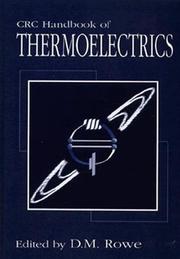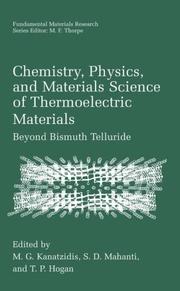| Listing 1 - 10 of 49 | << page >> |
Sort by
|
Book
ISBN: 9175190672 Year: 2015 Publisher: Linköping, Sweden : Linköpings University,
Abstract | Keywords | Export | Availability | Bookmark
 Loading...
Loading...Choose an application
- Reference Manager
- EndNote
- RefWorks (Direct export to RefWorks)
Multi
ISBN: 9780128184141 0128184140 9780128184134 0128184132 Year: 2021 Publisher: Amsterdam Elsevier
Abstract | Keywords | Export | Availability | Bookmark
 Loading...
Loading...Choose an application
- Reference Manager
- EndNote
- RefWorks (Direct export to RefWorks)

ISBN: 0849301467 Year: 1995 Publisher: Boca Raton CRC
Abstract | Keywords | Export | Availability | Bookmark
 Loading...
Loading...Choose an application
- Reference Manager
- EndNote
- RefWorks (Direct export to RefWorks)
Book
ISBN: 9179293247 Year: 2022 Publisher: Linköping : Linkopings Universitet,
Abstract | Keywords | Export | Availability | Bookmark
 Loading...
Loading...Choose an application
- Reference Manager
- EndNote
- RefWorks (Direct export to RefWorks)
This dissertation by Binbin Xin explores the development of flexible inorganic and hybrid thin films based on layered calcium cobaltate (Ca3Co4O9). It focuses on the conversion of waste heat into electricity, addressing the need for self-sustaining energy sources in wearable and miniaturized electronics. The study highlights the advantages of calcium cobaltate, such as low cost, chemical stability, and the use of abundant raw materials, while tackling the rigidity of traditional inorganic materials. Through innovative fabrication techniques and the creation of nanoporous and hybrid films, the research aims to enhance the performance and flexibility of these materials. The intended audience includes researchers and professionals in materials science and engineering, particularly those interested in thermoelectric materials and sustainable energy solutions.

ISBN: 0306477386 Year: 2003 Publisher: New York : Kluwer Academic/Plenum Publishers,
Abstract | Keywords | Export | Availability | Bookmark
 Loading...
Loading...Choose an application
- Reference Manager
- EndNote
- RefWorks (Direct export to RefWorks)
Book
Year: 2019 Publisher: London, England : IntechOpen,
Abstract | Keywords | Export | Availability | Bookmark
 Loading...
Loading...Choose an application
- Reference Manager
- EndNote
- RefWorks (Direct export to RefWorks)
Advanced Thermoelectric Materials for Energy Harvesting Applications is a research-intensive textbook covering the fundamentals of thermoelectricity and the process of converting heat energy into electrical energy. It covers the design, implementation, and performance of existing and advanced thermoelectric materials. Chapters examine such topics as organic/inorganic thermoelectric materials, performance and behaviors of thermoelectric devices, and energy harvesting applications of thermoelectric devices.
Book
Year: 2019 Publisher: London, England : IntechOpen,
Abstract | Keywords | Export | Availability | Bookmark
 Loading...
Loading...Choose an application
- Reference Manager
- EndNote
- RefWorks (Direct export to RefWorks)
Advanced Thermoelectric Materials for Energy Harvesting Applications is a research-intensive textbook covering the fundamentals of thermoelectricity and the process of converting heat energy into electrical energy. It covers the design, implementation, and performance of existing and advanced thermoelectric materials. Chapters examine such topics as organic/inorganic thermoelectric materials, performance and behaviors of thermoelectric devices, and energy harvesting applications of thermoelectric devices.
Book
ISBN: 9789176855393 Year: 2017 Publisher: Linkopings Universitet
Abstract | Keywords | Export | Availability | Bookmark
 Loading...
Loading...Choose an application
- Reference Manager
- EndNote
- RefWorks (Direct export to RefWorks)
This thesis by Mohammad Amin Gharavi focuses on the synthesis and theoretical prediction of nitride thin films, particularly exploring cubic chromium nitride (CrN) for thermoelectric applications. The research addresses the challenge of improving energy efficiency in devices that convert thermal gradients to electrical energy via the Seebeck effect. CrN films demonstrated promising properties such as high power factors and low thermal conductivity, potentially offering a more cost-effective and stable alternative to traditional materials. The study also investigates hypothetical ternary nitrides, aiming to enhance thermoelectric performance by reducing thermal conductivity. This work is intended for researchers and professionals in material science and physics, supported by extensive calculations and experimental methodologies.
Book
Year: 2019 Publisher: London, England : IntechOpen,
Abstract | Keywords | Export | Availability | Bookmark
 Loading...
Loading...Choose an application
- Reference Manager
- EndNote
- RefWorks (Direct export to RefWorks)
Advanced Thermoelectric Materials for Energy Harvesting Applications is a research-intensive textbook covering the fundamentals of thermoelectricity and the process of converting heat energy into electrical energy. It covers the design, implementation, and performance of existing and advanced thermoelectric materials. Chapters examine such topics as organic/inorganic thermoelectric materials, performance and behaviors of thermoelectric devices, and energy harvesting applications of thermoelectric devices.
Book
ISBN: 9789175197418 Year: 2013 Publisher: Linkopings Universitet
Abstract | Keywords | Export | Availability | Bookmark
 Loading...
Loading...Choose an application
- Reference Manager
- EndNote
- RefWorks (Direct export to RefWorks)
This dissertation by Olga Bubnova explores the properties of conducting polymers, focusing on their potential for waste heat recovery. Bubnova investigates the thermoelectric efficiency of materials like Pedot, highlighting their low thermal conductivity and the ability to enhance electrical conductivity through doping. The research aims to provide a cost-effective and environmentally friendly solution to energy conversion challenges. The work is directed toward scientists and engineers interested in sustainable energy technologies, particularly in optimizing the performance of organic thermoelectric generators (OTEGs) for industrial and household applications. The findings suggest that conducting polymers, traditionally overlooked for energy conversion, can be optimized to improve their performance, offering a promising avenue for waste heat utilization.
| Listing 1 - 10 of 49 | << page >> |
Sort by
|

 Search
Search Feedback
Feedback About UniCat
About UniCat  Help
Help News
News